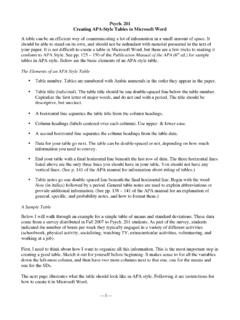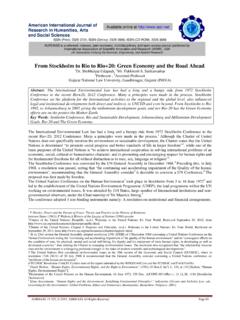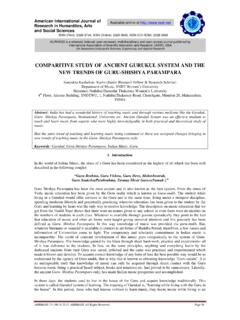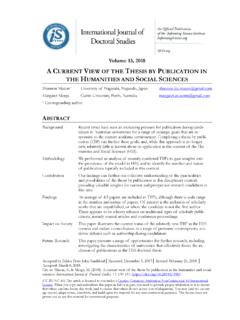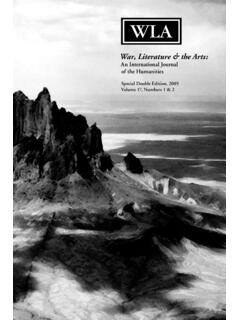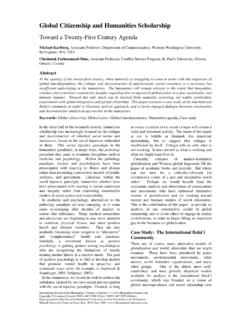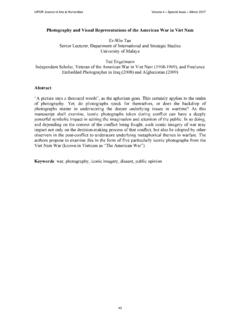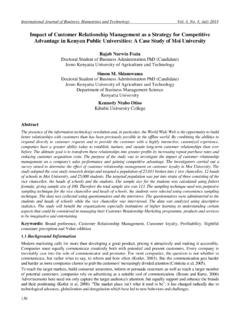Transcription of The International Journal of Literary Humanities
1 The International Journal ofLiterary 10 ISSUE 2 _____Orpheus, the Poetics of Silence, and the HumanitiesANGELA PITTSTHE International Journal OF Literary Humanities published in 2013 in Champaign, Illinois, USA by Common Ground Publishing University of Illinois Research Park 2001 South First St, Suite 202 Champaign, IL 61820 USA ISSN: ISSN 2327-7912 2013 (individual papers), the author(s) 2013 (selection and editorial matter) Common Ground All rights reserved. Apart from fair dealing for the purposes of study, research, criticism or review as permitted under the applicable copyright legislation, no part of this work may be reproduced by any process without written permission from the publisher. For permissions and other inquiries, please contact The International Journal of Literary Humanities is a peer-reviewed scholarly Journal . Orpheus, the Poetics of Silence, and the Humanities Angela Pitts, University of Mary Washington College, USA Abstract: In the Vergilian version of the katabasis of Orpheus, spatial and interpersonal silences serve to punctuate both the extraordinary poetic triumph of Orpheus and the tragic consequences of his failure.
2 The katabatic hero is a recurring archetype in classical poetry: the ability of a living being whose soul is still attached to corporeal flesh to enter the realm of the dead and return alive marks the hero as one who possesses exceptional status. Unlike the successful journeys to the underworld of other epic heroes like Odysseus and Aeneas, the tragic failure of Orpheus katabasis ultimately results in the brutal silencing of his art. His failure to meet the objective of his katabasis leads to a failure of poetics, a failure ironically foreshadowed by the success that he encounters at various stages of his journey, which are marked by curious silencings, as the custodians, criminals and topographical features of the Underworld give way into total quiescence upon hearing his song. This paper will examine the rhetoric of silence in the Vergilian adaptation of the myth of Orpheus, and suggest that Vergil s unique adaptation of the myth may be read as allegorically relevant to the struggle of the Humanities disciplines to survive in the contemporary academy.
3 Keywords: Vergil, Orpheus, Classical Literature, Classical Poetry, Myth or Mythology, Humanities There are many ways to stimulate the imagination, from reading literature, studying and creating art, to reviewing history. But, the lynchpins that most often tie other studies together are history and story-telling, oral and written. No disciplines outside the Humanities more effectively allow us to put on the shoes of others in past ages and different circumstances. 1 tate support for higher education in the contentious political and economic climate of the United States is waning. As states place conditions on how institutions of higher education may spend their decreased budgets and as they place caps on what institutions may earn through tuition and fee increases, disciplines in the Humanities have had to rely on varying degrees of benevolence, persuasive power and support from administrations to make the case for disciplines that do not offer obvious vocational tracks.
4 Draconian budget cuts, where applied, have generally been levied first against the Humanities , leaving whole disciplines struggling for survival. Jim Leach, the Chairman of the National Endowment for the Humanities , recently reported that federally funded research in the Humanities in the constitutes about 1/25,000th of the federal budget, barely more per capita than the cost of a postage stamp. 2 Various practical and ideological apologia seem to have had little persuasive impact. Robert Watson s cost/benefit analysis of student-credit hours, fee levels, and general fund expenditure, for example, has argued that Humanities faculty and courses are relatively cheap and generate profits for institutions,3 while Jim Leach makes the utilitarian argument ( How can we compete in our own markets if we don t write, think and communicate well and understand our own culture and 1 I would like to offer my immeasurable gratitude to Federico Schneider and Teresa Kennedy, whose views do not necessarily reflect my own, for the many conversations which inspired this paper.)
5 Thanks also to Joseph Romero, who read multiple versions of this paper, and to the editor and blind readers for their thoughtful suggestions, which undoubtedly served to improve. Leach, Jim. The Power of the Humanities . Presented at the American Council of Learned Societies, Philadelphia, PA on May 11, 2012. Accessed June 11, 2012. 2 Leach, Jim. Humanities and Citizenship Presented at the National Academy of Education 2011 Annual Meeting at George Washington University, October 28, 2011. Accessed June 11, 2012. 3 Watson, Robert N. Bottom Line shows Humanities Really Do Make Money. UCLA Today. March 13, 2010. Accessed May 9, 2012. S The International Journal of Literary Humanities Volume 10, 2013, , ISSN: 2327-7912 Common Ground, Angela Pitts, All Rights Reserved Permissions: cg THE International Journal OF Literary Humanities its enormous variety of subcultures; or abroad if we don t understand foreign languages, histories and traditions?
6 4 in most of his public speeches. Martha Nussbaum (2010) and Geoffrey Galt Harpham (2011) have each argued that: marketing Humanities skills (critical thinking, empathy, imagination, effective communication, etc.) as professional skills betrays our responsibility to preserve and transmit timeless monuments of culture (ars gratia artis) in favor of credentialing students to enter the job market of the moment; and that education should not be reduced to a corporatized and instrumentalized function of the gross national product. In a series of NY Times Op Eds, Stanley Fish lambasted both Robert Watson s Bottom Line and other utilitarian arguments in favor of a more pessimistic view, claiming that these arguments persuade no one, and that the Humanities cannot be argued to do anything except offer pleasure. Moreover, he touts, higher education, properly understood, is distinguished by the absence of a direct and designed relationship between its activities and measurable effects in the world.
7 5 Frank Donoghe (2008) offers among the most pessimistic of assessments, arguing that the Humanities do not face a crisis (which suggest that a natural order may eventually be reestablished), but near-extinction as vocationally streamlined curricula will soon push out most other offerings of corporatized universities. As we defend (among other disciplines) the relevance of the classics at the historical heart of the liberal arts, we may do well to apply that relevance to help us negotiate our way through our current crisis . The classical poets, who offered lene consilium 6 ( gentle counsel ) in response to the crises of their own ages and whom we now endeavor to protect from disappearance, may be turned to as guides, just as Dante looked to Vergil and his predecessors to provide an enlightened path through the political and social turmoil of the Italian trecento.
8 This paper turns to Vergil s adaptation of the myth of Orpheus for counsel on what is at stake for the Humanities . Vergil s adaptation of the Orphic myth centers on the theme of artistic consciousness, and it is precisely this condition which lies at the soul-center of Humanist inquiry. Having inherited the story from a variety of Greek sources (including Euripides, Plato, Palaephatus, Hermesianax, and Moschus), Vergil may have invented the second loss of Eurydice as a symbolic postlude for his own Unlike the journeys to the underworld of other epic heroes like Odysseus and Aeneas, the tragic irony of the katabasis of Orpheus in Vergil s adaptation resides in the fact that Orpheus poetic triumph ultimately results in the brutal silencing of his art. This paper will examine the rhetoric of silence in the Vergilian adaptations of the myth of Orpheus, focusing particularly on the unique narratological value of the various kinds of silences (speechlessness, muteness, stillness, dumbness, quietude, etc.)
9 In the realm of Tartarus, spatial and interpersonal silences serve to punctuate both the extraordinary poetic triumph of Orpheus and the tragic 4 Leach, Jim. The Power of the Humanities . Presented at the American Council of Learned Societies, Philadelphia, PA on May 11, 2012. Accessed June 11, 2012. 5 Fish, Stanley. The Crisis in the Humanities Finally Arrives. The New York Times. October 11,2010. Accessed June 4, 2012; The Crisis of the Humanities II. The New York Times. October 18, 2010. Accessed June 4, 2012. Quote taken from the op-ed, The Last Professor. The New York Times. January 18, 2009. Accessed June 12, 2012. 6 Lee (1996, p. 138) suggests that the lines, lene consilium et datis et dato/ gaudetis, almae ( You give gentle counsel and you rejoice when gentle counsel has been given, nourishing ones. Horace, Odes ) refer to the four-day reading of Vergil s Georgics to Octavian in 29 , and indicate that Horace understood Vergil s Georgics as a poetic method of offering advice to a man who very much needed to hear it.
10 7 For a discussion of the variations of the myth in the Greek antecedents, see Lee (1996, p. 1-11), who eloquently states (p. 11): Virgil wanted a symbolic postlude for his Georgics. Orpheus must have seemed the mythic figure best suited to his purposes. Orpheus' songs, like Virgil's own, were sung for trees and animals. His rituals were, like Virgil's poem, concerned with both agriculture and the mysteries of life and death. Only one element seemed lacking. In other myths that told of the seasons, of the crop cycle, and of the annual death and rebirth of the land, the dead person Persephone, Castor, Adonis is allowed to return to earth only for a time. Orpheus' wife, in the tradition, was restored on no such terms. To turn the Orpheus Eurydice myth into a story suited to his purposes, Virgil needed more than his predecessors had provided. Heath (1994), however, argues that there is no compelling evidence to suggest that earlier Hellenic versions of the story ever represented Orpheus returning to the upper-air from the underworld with his wife.


